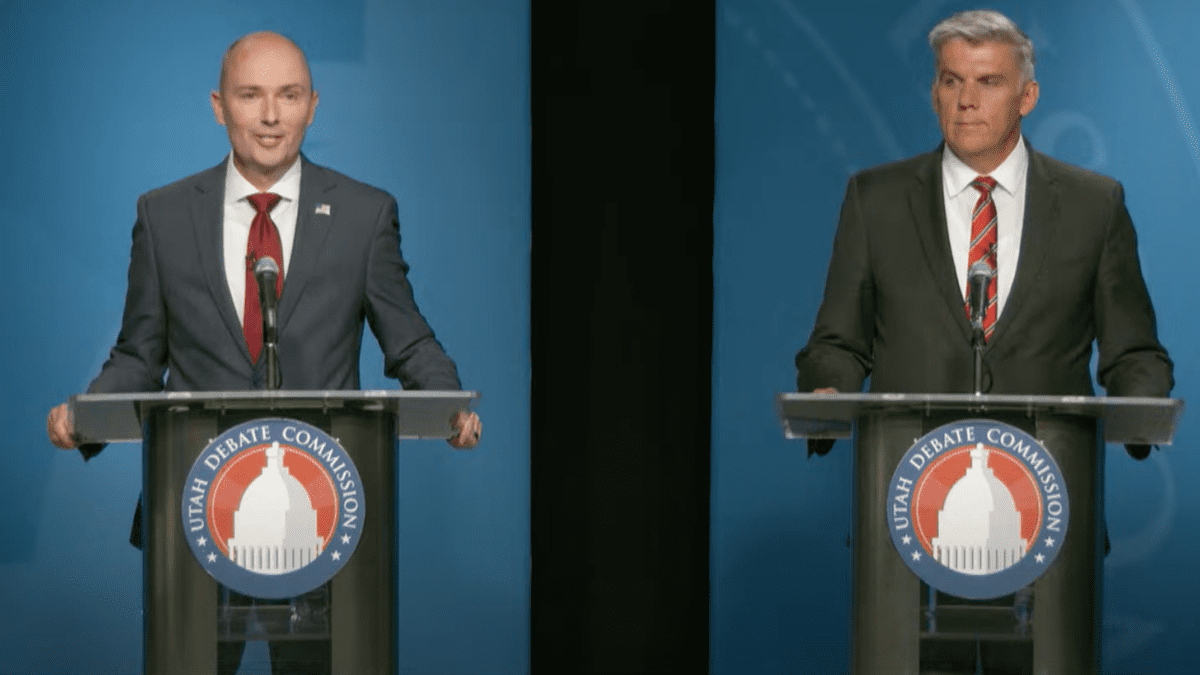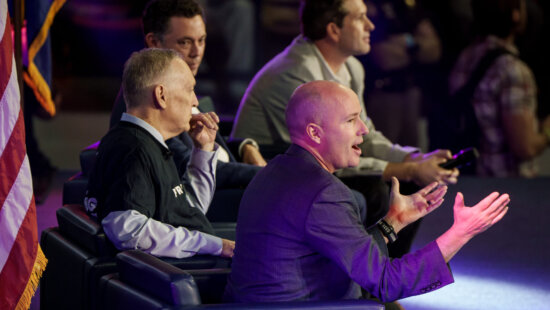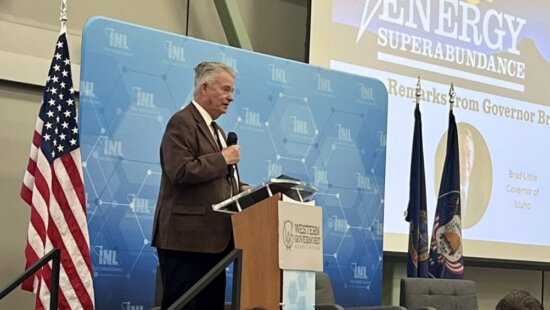Politics
Lyman, Cox square off in gubernatorial debate

Governor Spencer Cox and State Rep. Phil Lyman at the 2024 gubernatorial Republican debate on Tuesday, June 11. Photo: Utah Debate Commission.
SALT LAKE CITY – State Representative Phil Lyman and current Governor Spencer Cox faced off in a gubernatorial debate on Tuesday night, allowing the two Republicans to answer questions on a wide range of subjects before the Republican primary on June 25th.
In a debate that remained civil, despite Lyman’s constant campaign ads criticizing and attacking Gov. Cox, the debate was focused on policy surrounding affordable housing, homelessness, the 2034 Olympics, and water.
The televised gubernatorial debate was hosted by the Utah Debate Commission and recorded at PBS’s Utah Studio in Salt Lake City, and was moderated by Caroline Ballard, assistant news director for KUER and NPR Utah.
Lyman, who is trailing Cox in the polls by nearly 40%, began the debate by explaining that Utahns need a leader who will tell them the harsh truth.
“Thomas Sowell said, if you want to help people, tell them the truth. If you want to help yourself, tell them what they want to hear,” Lyman said in his opening remarks. “I”m willing to tell people the harsh reality, that’s kind of what I do.”
“In Utah, we’ve got some harsh realities that we need. There’s a lot of collusion, a lot of corruption that takes place in in the policy making of Utah. These things that I’ve observed both at the county level, it’s at the federal level and at the state level, those things lead to bad policies that actually end up hurting people’s lives.”
Gov. Cox, on the other hand, used this platform to outline some of his accomplishments as governor, detailing historic tax cuts, salary increases for teachers, recently enacted abortion laws, and the implementation of school choice, among others.
The debate quickly evolved into policy-based discussion with the two men describing their ideas to curb some of Utah’s biggest problems.
Related to affordable housing, Cox briefly explained how his administration has been working with homebuilders in the private sector to construct more affordable homes.
“This is the single most important issue in our state right now,” Cox said about the lack of affordable housing.”We are working with developers right now, they’re going to be able to get loans. We’re working with them to build these starter homes, and these are homes for under $300,000. That’s were we are headed, and that’s what we are going to do.”
Cox has previously outlined a plan to build 35,000 affordable homes by 2028.
Lyman disagreed with his opponent, arguing that the government cannot solve the problem of the lack of affordable housing.
“This is the comforting myth that we like to tell ourselves, is the government is going to solve this problem,” Lyman said. “The truth is that free market principles are going to fix this problem.”
Lyman also articulated that multi-million dollar homes and homes built in highly populated areas can also be attributed to the problem, and stated that “throwing money at it is not going to fix the problem.”
The two candidates also disagreed on the homelessness issue, a debate that had been a prominent issue in the Utah Legislature’s 2024 session.
Gov. Cox stressed the fact that homelessness should not just be seen as an issue in Salt Lake City or Salt Lake County, as he believes “homelessness is an issue that affects everyone in this state.”
Referring back to the 2024 Legislative session, Gov. Cox mentions how he has worked very closely with the Utah Legislature to combat homelessness, including over $50 million in funding, part of which will be used to construct a new shelter in Salt Lake City.
In disagreement with Gov. Cox, Lyman argued that state mandates are “inappropriate.”
“As a legislator, it’s always frustrating to see us take away powers from the local governments,” Lyman said. “Mandates that come down from the state, funded or unfunded, are inappropriate.”
Instead of addressing homelessness as a statewide issue, Lyman believes that local governments should make decisions on issues that they are most affected by. Lyman also added that when the state government imposes laws or regulations on local government it is “overstepping boundaries.”
In his answer, Lyman did not address whether the state should play a role to address homelessness.
Another main point of disagreement between the two candidates related to the possibility of the Winter Olympics returning to Utah in 2034.
Gov. Cox was rather enthusiastic about the possibility of a return, while Lyman was more reserved, questioning the costs and people it would bring to the state.
Cox emphasized the fact that the Olympics should not cost any of Utah’s taxpayer funds.
“Utah’s financial responsibility should be zero, and it will be zero,” Cox said. “All of this is going to be paid for by sponsorships. It’s not going to cost the taxpayers a single penny, and we should be proud of that.”
Lyman, on the other hand, expressed skepticism about infrastructure costs and the amount of people that will flock to the state.
“I remember the last Olympics,” Lyman said. “The cost of infrastructure, the cost of delays, the cost of congestion. It brings a lot of people to Utah, and it brings a lot of people to Salt Lake City.”
Lyman then mentioned he would believe if a poll was conducted it would not show a majority of Utahns in favor of the Olympics returning. Gov. Cox then interrupted, citing a Deseret News poll that was recently conducted showing 79% of Utahns favored hosting the Olympics in 2034.
“I’m not saying the Olympics is unpopular; we all love the Olympics,” Lyman said after Cox mentioned the poll. “But to bring the Olympics to Utah again is a cost to our state and to our counties and to our communities. And to say otherwise is being disingenuous.”
Despite the two governor candidates disagreeing on several issues, there was common ground between the two, as they agreed on the President Biden’s mishandling of the border crisis and the federal government overstepping it’s Constitutional boundaries, the perceived victory of overturning Roe v. Wade and enacting abortion legislation, and the recent enactment of school choice policies, among others.



















